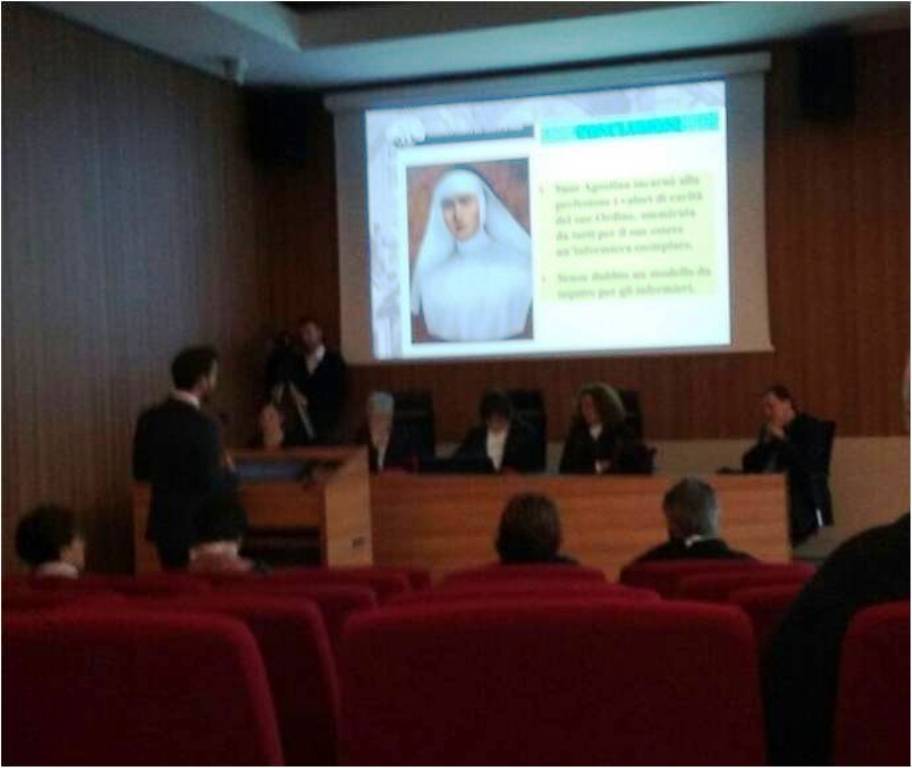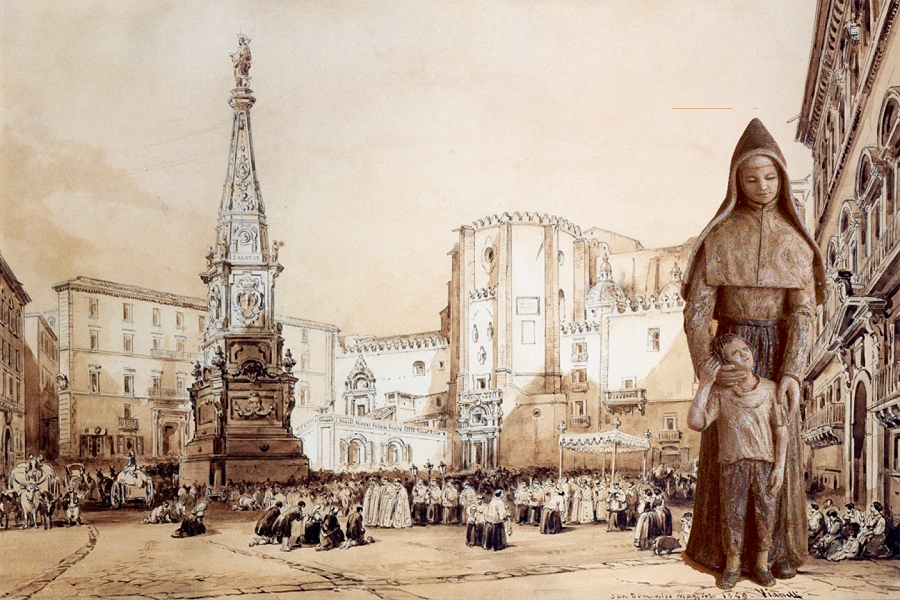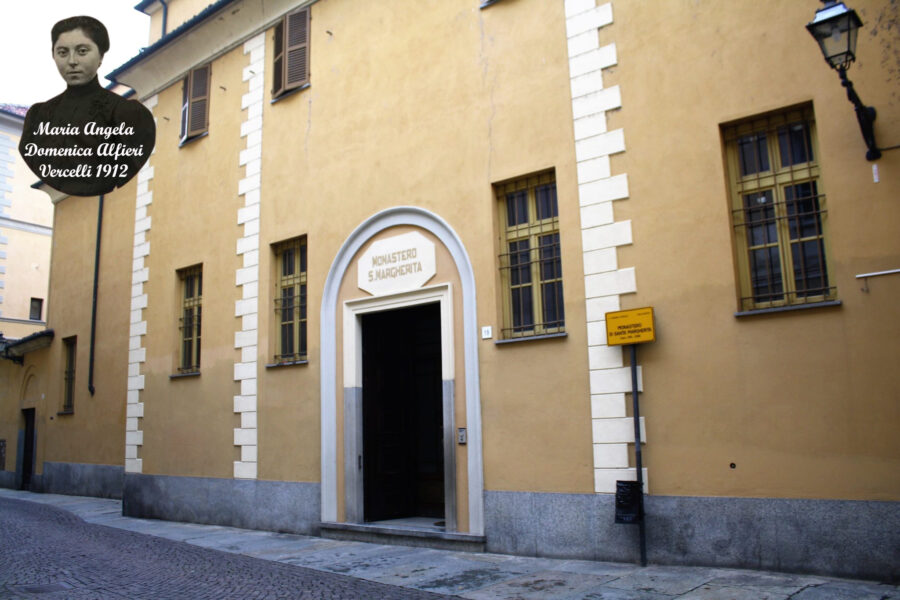It’s Andrea Angelucci from Rome, the student who on the 10th March last, discussed his Degree Thesis in nursing, at the Faculty of Medicine and Surgery of the Bio-Medical University Campus of Rome
The specificity of his work consists in the fact that this young man has chosen a topic that closely concerns us, Sisters of Charity of St. Jeanne Antide Thouret:
Sr. Agostina Pietrantoni (1864-1894):
a model and a patron
for the Italian nurses.
One can imagine both our amazement and joy when the young man Andrea Angelucci asked to compare his online data with ours, as well as those which he had found in some archives available in the city of Rome.

One of his professors, Luca Borghi who actually teaches “History of Medicine”, “History of technology in Medicine and “History of Medicine and Nursing Studies” is a researcher and inventor of an International prSr. Agostina Pietrantoni… at the Universityoject that supports the identification and the development of the material traces left by the history of medicine and by the other disciplines related to it.
In one of his research work within the Hospital of Santo Spirito in Rome, he glimpsed a text bearing the so called “Decalogue of St. Agostina”[1] and when the student Andrea discussed with him the reason for choosing this topic, the professor suggested to him to go through Agostina’s service with the sick and to identify the origin and the traces of the Nurses’ Decalogue, which is actually little or barely known at all. Besides, he told him to explain how he managed to indicate openly the nurse Agostina as a model to the persons who wish to practice the nursing service with the sick.
Having finished his work, which surely requires further research, since the assets in Santo Spirito are still unexplored as they are not yet available due to slow works in progress concerning the reorganisation of both the library and the archives, we couldn’t however refuse the invitation to participate in the discussion of this same thesis. Early in the morning, Sr. Ines Triberti, Sr. Anna Antida Casolino, Sr. Maria Pia Baldini headed towards the university faculty who were soon greeted by Andrea’s family, already familiar with the General house, the tutor, Professor Borghi and the commission’s President who expressed on the microphone, her thanks for our participation: “ It’s an honour for us to have you here with us, today”. The three of us were thrilled … St. Agostina was with us!
Thus, our saint has entered into an environment to which she still has a lot to communicate. We tried to approach the students’ chaplain and the didactic secretariat. The promise? Don’t fail to allow this faculty to become acquainted with a “colleague”, as she has been defined, who must be highly considered at the human, professional and religious level.
Let us all give thanks to the Lord
For those who wish to read something extra, we are attaching here the conclusion of Andrea’s work :
«Sr. Agostina Pietrantoni accomplished her nursing profession for seven years until her death in 1894. She perfectly embedded the values declared by St. Jeanne Antide and diffused by her Institute, that of the Sisters of Charity.
But Sr. Agostina was able to express herself better as she rendered herself precious not only for her religious virtues, but also and primarily for her professional qualities.
Such acknowledgement was attributed to her by all her contemporaries: not only by the Catholics but also by those who supported and desired that “lay Regime” which clearly limited her and her co-sisters in accomplishing their daily practice. In fact, up to 1870, as we have seen in the Project dated 1849 that has been brought forth, the sisters’ duties were equally divided between purely nursing and religious tasks. Instead, in this historical moment, which meant to be very particular and problematic for them, “secularism” suppressed all their prerogatives characterised by religion, which in the previous decades, on the contrary, were explicitly demanded from them in the hospital and domain.
Today, we too, as we read the biography of Sr. Agostina and her quotations, we cannot fail to admire her dedication and the spirit with which she accomplished the profession.
Then, going through the witnesses brought forth by those who knew her directly, it seems clear that this young sister exemplified her nursing role with such a big expertise, that she can be surely considered a model in the history of nursing assistance in Italy.
Sure, if Sr. Agostina had personally written the Decalogue, we would have considered her a forerunner of the nursing profession of the end of the 19th Century, because it would have been a first important attempt to regulate a profession which up to this present day, has not yet been definitively structured, and which in that historical moment, especially in our country, was not yet organised.
Anyway, the value of these “precepts”, having been set in relation to her work and her ethics, enable us doubtlessly to elevate her as model for her modern colleagues.
It therefore appears beneficial that her event become more acknowledged in the future and that the obscurity still present regarding her name, unbelievably embedded among the same professionals, will disappear at the earliest.
In the long run, this degree thesis, intends also to reach this didactic goal, because Sr. Agostina’s example, having reached us intact in both its validity and beauty even after over a century, will surely remain precious and useful even in the future years.
Sr. Agostina Pietrantoni: is not only a Patron Saint, but also and primarily a model for the Italian nurses».
Photos:
Andrea.Here he is with his sister
The Mentor Prof. Luca Borghi
Andrea’s parents – the chaplain and one of Andrea’s friends
Andrea presenting his work
{gallery}sr Agostina all Universita{/gallery}
[1] We know that the nurses’ Decalogue has not been composed by St. Agostina. It consists of a list of principles taken from her words and attitudes in relation to the sick people. Within the articles elaborated by the biographer Alessandro Pronzato, we find the entire Agostina. Her virtue and professional ethics are witnessed in the process of canonization, which defines the identity, strongly motivated and dedicated to serve Jesus in the suffering.











